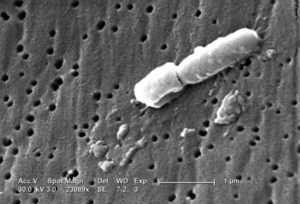 The following is a nice article about a recently published study finding a link between some bacteria commonly found in the mouth and inflammatory bowel diseases (IBD). The researchers found that some strains of oral bacteria are also found in the gut of people with inflammatory bowel diseases.
The following is a nice article about a recently published study finding a link between some bacteria commonly found in the mouth and inflammatory bowel diseases (IBD). The researchers found that some strains of oral bacteria are also found in the gut of people with inflammatory bowel diseases.
They theorize that these bacteria make it down to the gut when saliva is swallowed - and for susceptible people this may trigger inflammatory disease. They did a number of experiments to determine that the antibiotic-resistant, inflammation causing species of Klebsiella pneumoniae and Klebsiella aeromobilis could be triggering IBD. These bacteria are able to replace normal colon microbes after antibiotic therapy.
However, it must be noted that other studies also find other microbial differences among those with IBD and healthy people - e.g. low or absent levels of Faecalibacterium prausnitzii, and even fungal and viral differences. From Harvard Magazine:
Gut Health May Begin in the Mouth
Chronic gastrointestinal problems may begin with what is in a patient’s mouth. In a study published Thursday in Science, an international team of researchers—including one from Harvard—reported on strains of oral bacteria that, when swallowed in the 1.5 liters of saliva that people ingest every day, can lodge in the gut and trigger inflammatory bowel conditions like Crohn’s disease and ulcerative colitis.
“For some time now, we’ve noticed that when we look at the microbiome of patients with inflammatory bowel disease, or IBD, we’ve found microbes there that normally reside in the oral cavity,” says study co-author Ramnik Xavier, chief of gastroenterology at Massachusetts General Hospital (MGH)....
Simultaneously, “There’s always been this other search, asking, ‘Are there pathobionts?’”—in other words, microbes that live innocuously in one part of the body but can turn pathogenic when moved to another. “For some time we have been looking for pathobiont organisms for Crohn’s and colitis.”
The researchers believe they have found them: two strains of Klebsiella bacteria, microbes commonly found in the mouth. ....the researchers pinpointed a strain of Klebsiella pneumoniae as the trigger for the immune response. A subsequent experiment using samples from two ulcerative colitis patients turned up another inflammation-causing strain, of Klebsiella aeromobilis.
Checking databases of thousands of IBD patients at MGH and the Hospital of the University of Pennsylvania, Xavier and others found that people with inflammatory bowel conditions had significantly more Klebsiella bacteria in their gut microbiome than healthy patients did. Most likely, he explains, oral bacteria, including Klebsiella, traffics through everyone’s gut in the saliva we swallow. Usually it passes through harmlessly; but in people with a genetic susceptibility to IBD that alters the gut microbiome, the Klebsiella has a chance to take hold in the intestine and proliferate, inducing an immune response that causes the disease.
And there is another twist: Klebsiella bacteria are often extremely resistant to multiple antibiotics. That explains, Xavier says, “why antibiotics have limited value in treating patients with Crohn’s disease and ulcerative colitis.... “Because we also showed in a 2014 paper that patients who took antibiotics—and this has been seen in the old clinical data accumulated before the microbiome was even examined in IBD—that patients who took antibiotics early in the disease had more complicated outcomes.”
 Klebsiella pneumoniae Credit: Wikipedia
Klebsiella pneumoniae Credit: Wikipedia

 Interesting idea - that perhaps our community of gut microbes being out of whack (dysbiosis) leads to hypertension. This study was done in both humans and mice - with an analysis of bacteria in both
Interesting idea - that perhaps our community of gut microbes being out of whack (dysbiosis) leads to hypertension. This study was done in both humans and mice - with an analysis of bacteria in both